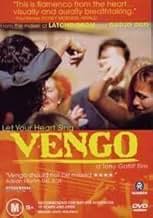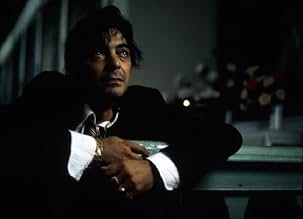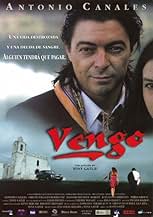Vengo
- 2000
- 1h 30min
CALIFICACIÓN DE IMDb
7.2/10
3.1 k
TU CALIFICACIÓN
Agrega una trama en tu idiomaVengo is a majestic ode to the artistry and magic of flamenco dancing, set against the compelling backdrop of two gypsy families locked in an age old struggle for power.Vengo is a majestic ode to the artistry and magic of flamenco dancing, set against the compelling backdrop of two gypsy families locked in an age old struggle for power.Vengo is a majestic ode to the artistry and magic of flamenco dancing, set against the compelling backdrop of two gypsy families locked in an age old struggle for power.
- Dirección
- Guionistas
- Elenco
- Premios
- 2 premios ganados y 1 nominación en total
Antonio Dechent
- Primo Alejandro
- (as Antonio Pérez Dechent)
Juan-Luis Barrios Llorente
- Primo Caravaca 2
- (as Juan Luis Barrios Llorente)
Opiniones destacadas
Indeed, not a bad documentary (barely a real film, the plot is just an excuse to the connection of the different flamenco scenes). Antonio Canales is surprisingly good as Caco, and the other characters are of no relevance to the story whatsoever. Orestes, Caco's nephew with cerebral palsy, is actually Antonio Canales' nephew. Undoubtable epic flavor in this escape/flamenco journey. Good details, as the nice landscapes in Cadiz and the references to Caco's relative "exiled" in the Spanish cities of North Africa. Great and not so commercial flamenco singers, such as La Paquera(R.I.P) and La Caita. Special attention to the closing song, "Naci en Alamo".
For me there's nothing better than a film about the affairs of exotic people from other lands that is full of spirited music, no matter how flimsy the plot. "Vengo" is an exemplary case. It is the latest in a series of films about Romany people and their music made by Tony Gatlif. He brings impeccable credentials to the task: born in Algeria, raised in Marseille, his mother is Roma and his father a Berber. His best known film is the 1993 homage to Roma music, "Latcho Drom" (Safe Journey), which I have yet to see. "Vengo" is set in Andalusia, in southern Spain, in the city of Seville and surrounding villages. Here a rich tradition of Berber, Romany and Jewish origins has shaped the culture and given the world a distinctive music: flamenco. This film is best viewed as a flamenco concert featuring a number of different singers, instrumentalists, dancers and ensembles, most of whom are outrageously good. The musical numbers are connected by an insubstantial narrative, a loosely unfolding story of a blood feud, a dialectic of deaths, between two rural Roma families. Caco (the flamenco dancer, Antonio Canales, who doesn't get to dance at all here) is a bereaved nightclub owner and heavy boozer whose teenage daughter was killed by members of the Caravaca family. In return Caco's brother Mario killed a Caravaca man and is hiding in Morocco. The Caravacas now demand their turn for revenge and, in Mario's absence, let out word that they plan to murder Mario's son, Diego (Orestes Villason Rodriguez), a 20-something man who suffers from cerebral palsy. Caco dearly loves and dotes on Diego, his nephew, and is set into a crazed state by this news. The story moves toward a tragic sacrificial climax. The plot does serve to convey the essential truth that grounds the passion of these people: that suffering and death itself are inevitable counterpoints to love and family loyalty. This backdrop gives embodiment to the deep emotions expressed in the music. There is also a single very humorous scene featuring cells phones, perhaps the funniest bit about these obnoxious instruments in all of filmdom. The turn contributed by Rodriguez (as Diego) is impressive; it is welcome indeed to see a person with cerebral palsy act a major role, especially when the performance is built much more on humanity than on handicap. (In Spanish)
The story is told by images and music. A real semiotic statement and another ode to the love of music by the gypsie people. The film tells you a story about a vendetta and the consequenses of it, played by real people with deep human emotions. A honest document, another masterpiece after Gadjo Dillo and Lacho Drome. I love this movie and it made me laugh and weep, also I couldn't sit still during the music scenes with authentic flamengo/gypsie music. Any music lover should see this film to explore the roots of spanish music.
Cultural drama about a gypsy feud and plenty of Flamenco music . The flick deals with the confrontation between two groups of gypsy clans , it starts with Caco (Antonio Canales) , a head of a gypsy community who attempts to protect everyone he loves , he is very powerful in the local neighborhood . Yet he has been torn to pieces by the death of his intimate child . He constantly visits her grave, weeps silently at her photo and has transferred all his wildly protective love and attention onto his dim-witted nephew Diego (Orestes) . It seems that Diego's father, Caco's brother (Antonio Dechent) is in hiding for killing a Caravacas member , who are equally powerful in the gypsy society . To complicate matters , Caco eventually wishes to forget his past but a gypsy clan seeks vengeance against his brother . They are seeking revenge and have come to Caco for justice . When he refuses to betray his brother who is fleeing after having killed a man from the Caravacas family , they grow impatient . They then realize they are getting nowhere, they threaten to murder Diego . Caco has become involved with the violent gypsy faction that puts him at odds with his own responsibilities . Despite his pride , Caco spontaneously realizes that the cycle of murder and vendetta must be broken .
This intense drama concerns about a blend of fiction and documentary about gypsy life . From start to finish this Flamenco film contains drama , an intrigue about gypsy feud , thrills , emotion and a lot of songs . It is an interesting vision of gypsy universe through a story of rivalry among two families . This issue about gypsy family confrontation has been previously treated in other films such as ¨Los Tarantos¨(1963) by Francisco Rovira Beleta with Carmen Amaya , Sara Lezana , Antonio Gades , ¨Montoyas y Tarantos ¨(1989) by Vicente Escriba with Sancho Gracia , Cristina Hoyos , Esperanza Campuzano and ¨Gypsy¨ (2000) by Manuel Palacios with Laeitia Casta and Joaquin Cortes . ¨Vengo¨ is a thought-provoking drama that keeps you interested and expecting , including a tragic final taking on . Main cast gives nice interpretations , as a good acting by Antonio Canales as Caco , a fierce proud , handsome man who protects his physically challenged nephew and a fine performance from Antonio Dechent as his brother who is in hiding after killing a Caravaca member . Emotive musical score including dances in Derviche style and gypsy-African sounds ; with Flamenco songs splendidly sung by a extraordinary plethora of gypsy singers such as El Moro , Manuel Vega Salazar , Tomatito , Sheikh Ahmad Al Tuni , La Caita , Gritos De Guerra , among others . The cinematographer, Thierry Pouget , is great with light, using it crude and clever , creative and beautiful . The motion picture well written by David Trueba was professionally directed by Tony Gatlif . This is a good film that has achieved international knowledge and Closed the Venice Film Festival in 2000.
This intense drama concerns about a blend of fiction and documentary about gypsy life . From start to finish this Flamenco film contains drama , an intrigue about gypsy feud , thrills , emotion and a lot of songs . It is an interesting vision of gypsy universe through a story of rivalry among two families . This issue about gypsy family confrontation has been previously treated in other films such as ¨Los Tarantos¨(1963) by Francisco Rovira Beleta with Carmen Amaya , Sara Lezana , Antonio Gades , ¨Montoyas y Tarantos ¨(1989) by Vicente Escriba with Sancho Gracia , Cristina Hoyos , Esperanza Campuzano and ¨Gypsy¨ (2000) by Manuel Palacios with Laeitia Casta and Joaquin Cortes . ¨Vengo¨ is a thought-provoking drama that keeps you interested and expecting , including a tragic final taking on . Main cast gives nice interpretations , as a good acting by Antonio Canales as Caco , a fierce proud , handsome man who protects his physically challenged nephew and a fine performance from Antonio Dechent as his brother who is in hiding after killing a Caravaca member . Emotive musical score including dances in Derviche style and gypsy-African sounds ; with Flamenco songs splendidly sung by a extraordinary plethora of gypsy singers such as El Moro , Manuel Vega Salazar , Tomatito , Sheikh Ahmad Al Tuni , La Caita , Gritos De Guerra , among others . The cinematographer, Thierry Pouget , is great with light, using it crude and clever , creative and beautiful . The motion picture well written by David Trueba was professionally directed by Tony Gatlif . This is a good film that has achieved international knowledge and Closed the Venice Film Festival in 2000.
A simple story of gossip and revenge in a Spaniard little town is the core of a great flamenco/gitano musical film, where you can see the Today's best artist of this musical genre. With a non-conventional camera that catch your senses in every story moment, great narration, music-video clip quality editing and all of that is combined with the rhythm of every song. The tragedy is exposed from the beginning but director address you there until the last second of the last image. Recommended for those with passion running in their bloods.
¿Sabías que…?
- TriviaClosed the Venice Film Festival in 2000.
- Bandas sonorasFusion Flamenco Soufi
Written by Tomatito, Sheikh Ahmad Al Tuni and Tony Gatlif
Guitars: Tomatito
Percussion Ramón Suárez Escobar and Israel Suárez Escobar
Violin: Bernardo Fernández Calvez
Palmas: Rafael García Serrano 'El Electrico' and Antonio Torrez Fernández
Singer: Sheikh Ahmad Al Tuni
Kamarga: Fath Abbas Hashem and Mostafa Benhmad
Oud: Mohamed Mahmoud Abdel Megid
Rapp: Rashidi Khamas Rashidi
Derbouka: Solman Al Tuni and Kamal Daas
Duff: Abbas Baktuari
Selecciones populares
Inicia sesión para calificar y agrega a la lista de videos para obtener recomendaciones personalizadas
- How long is Vengo?Con tecnología de Alexa
Detalles
Taquilla
- Total en EE. UU. y Canadá
- USD 124,994
- Fin de semana de estreno en EE. UU. y Canadá
- USD 5,704
- 9 sep 2001
- Tiempo de ejecución1 hora 30 minutos
- Color
- Mezcla de sonido
- Relación de aspecto
- 2.35 : 1
Contribuir a esta página
Sugiere una edición o agrega el contenido que falta

Principales brechas de datos
By what name was Vengo (2000) officially released in Canada in English?
Responda

















